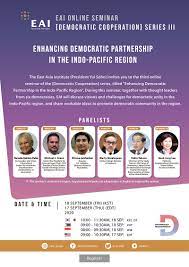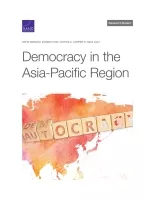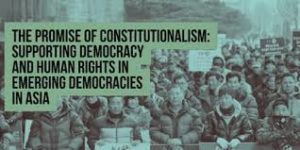The Indo-Pacific is quickly becoming the most important region for democracy support activities, as it embodies both growing support for democracy and recent evidence of backsliding, according to a new analysis from the Center for Strategic and International Studies.
The United States’ strategy for advancing democratic governance in the region will be more effective if it is developed and implemented in close consultation with like-minded regional states rather than simply delivered from Washington, say Michael J. Green, Nicholas Szechenyi and Hannah Fodale, the authors of Enhancing Democratic Partnership in the Indo-Pacific Region. They draw on case studies of the democracy assistance efforts of Australia, Japan, India, Indonesia, South Korea, and Taiwan to identify three priorities for U.S. engagement on democracy in the Indo-Pacific region:
 Engage with Asian Partners during the Democracy Summit’s “Year of Action.” The United States should work closely with allies and partners to encourage activities reflecting the diversity of regional stakeholders and their experiences with democracy. Encouraging partners in the region to take the lead in dialogue on key issues ranging from women’s empowerment to good governance would demonstrate the breadth of support in the region for President Biden’s agenda. Where regional allies and partners do take the lead on these issues, there should be opportunities for inclusion of states that might not be attending the democracy summits directly.
Engage with Asian Partners during the Democracy Summit’s “Year of Action.” The United States should work closely with allies and partners to encourage activities reflecting the diversity of regional stakeholders and their experiences with democracy. Encouraging partners in the region to take the lead in dialogue on key issues ranging from women’s empowerment to good governance would demonstrate the breadth of support in the region for President Biden’s agenda. Where regional allies and partners do take the lead on these issues, there should be opportunities for inclusion of states that might not be attending the democracy summits directly.- Utilize the Quad as an Avenue for Democracy Support. The United States should emphasize cooperation on democracy as a strategic priority for the Quadrilateral Security Dialogue (“the Quad”) with Australia, Japan, and India, and it should also network with countries outside the Quad construct, such as South Korea. All these countries are actively supporting democracy in the region but could achieve even greater impact by coordinating their efforts more closely…..
- Increase Support for Local Civil Society Groups. The United States can increase support for civil society groups by assisting countries such as Japan that structure their development assistance around request-based approaches from recipient governments. While these countries may find it challenging to directly fund local civil society groups or dissidents in autocratic countries, the United States has vast experience in this area and could help foster relationships between other donor governments and U.S. NGOs, which have developed networks with local NGOs across the region and can act as a conduit for support. As noted in the Sunnylands Principles, supporting democratic development in the Indo-Pacific necessitates a comprehensive approach that involves the diverse actors needed to advance responsive and accountable governance, including civil society, journalists, and governments.
 Many countries in South Asia have long been hoping for deeper ties with countries that would help counterbalance Beijing’s influence, notes Mohamed Zeeshan, Editor-in-Chief of Freedom Gazette and author of “Flying Blind: India’s Quest for Global Leadership.” The Biden Summit’s noble goal of furthering democracy and building ideological consensus against China could have been better fulfilled by a more inclusive summit, deeper engagement with civil society, and incentives to achieve specific goals, he writes for The Diplomat.
Many countries in South Asia have long been hoping for deeper ties with countries that would help counterbalance Beijing’s influence, notes Mohamed Zeeshan, Editor-in-Chief of Freedom Gazette and author of “Flying Blind: India’s Quest for Global Leadership.” The Biden Summit’s noble goal of furthering democracy and building ideological consensus against China could have been better fulfilled by a more inclusive summit, deeper engagement with civil society, and incentives to achieve specific goals, he writes for The Diplomat.
Enhancing Democratic Partnership
The US is unique in that NGOs and the private sector, as well as the government, are involved in promoting democracy support, the CSIS report adds. It cites the National Endowment for Democracy (NED – see below) and its core institutes’ engagement in operational planning, research and policy advice, and financial assistance to democratic institutions and organizations, as well as private sector support through its commitment to labor rights, transparency, anti-corruption, and governance and by incorporating human rights into overseas operations. RTWT
 The CSIS Japan Chair hosts a discussion reflecting on outcomes from the Summit for Democracy, and key findings from Enhancing Democratic Partnership in the Indo-Pacific Region.
The CSIS Japan Chair hosts a discussion reflecting on outcomes from the Summit for Democracy, and key findings from Enhancing Democratic Partnership in the Indo-Pacific Region.
The panel discussion (above) features: Ambassador Yukio Takasu, Chair, JCIE Future of Democracy Study Project, Special Advisor to the UN Secretary General on Human Security; former Japanese Ambassador to the United Nations; Sook Jong Lee, Professor, Graduate School of Governance, Sungkyunkwan University; Director of Asia Democracy Research Network and Senior Fellow, East Asia Institute; Dhruva Jaishankar, Executive Director, Observer Research Foundation America (ORF America); Lynn Lee, Associate Director for Asia, National Endowment for Democracy (NED). Moderated by: Michael J. Green, Senior Vice President for Asia and Japan Chair, CSIS; Director of Asian Studies, Georgetown University. Wednesday, December 15. 5:00-6:00PM ET. RSVP







